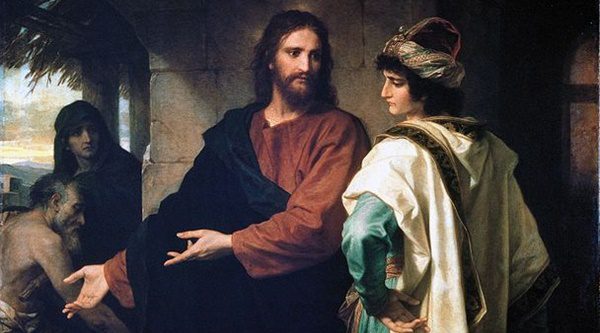
Pastors have a frequent question when they begin to discover mimetic theory. “That’s great. But how does it preach?”
Reverend Tom Truby shows that mimetic theory is a powerful tool that enables pastors to preach the Gospel in a way that is meaningful and refreshing to the modern world. Each Wednesday, Teaching Nonviolent Atonement will highlight his sermons as an example of preaching the Gospel through mimetic theory.
In this sermon, Tom explores the importance of forgiveness through a parable commonly known as the Parable of the Dishonest Manager. Tom explains how forgiveness, even if shrewdly offered, can open us up to the heart of God.
Year C, Pentecost 18
September 18th, 2016
By Thomas L. Truby
Luke 16:1-8
Forgetting to Forgive
By the time of Jesus the vast majority of the rural population had lost ownership of the land. Taxes had become so high the people fell in debt and were forced to sell their land to pay the taxes. Wealthy people bought this land and farmers thereafter worked for them. To run the farms they hired managers.
In Jesus’ story someone accuses the manager of squandering the land owner’s wealth. I wonder why Jesus tells this story to his disciples and the text makes it clear he is speaking to them. Are the disciples unhappy with Jesus who they secretly see as squandering God’s blessing by giving it away too freely? If even poor people and prostitutes, Roman collaborators and lepers share in God’s blessing, where is the payoff for disciples who have left all to follow Jesus? It’s not fair.
Jesus senses that the disciples are sliding toward the judgmental crowds in thinking the people he serves don’t deserve God’s blessing. In being so inclusive, causing the poor to feel valued and precious, is he giving away God’s benediction for nothing; squandering God’s wealth uselessly, so to speak? Could the disciples be like the resentful older brother in the story of the prodigal’s return who refuses to welcome the returning prodigal even though he is family? And this, by the way, is the story Jesus told just before he focuses on his disciples in this story.
In Jesus’ story the land owner summons the manager and says to him, “What is this that I hear about you? Give me an accounting of your management, because you cannot be my manager any longer.”
Notice the land owner asks a question of the manager but gives him no opportunity to explain himself. He’s fired before he can say a word! It reminds me of Jesus standing before the crowd who accuse him of falsely speaking for God and have no interest in his guilt or innocence. He’s just guilty and condemned because he has been accepting people he should not be accepting. He hasn’t been honoring the rules on who to exclude.
If we take this interpretation, then the owner of the land is us; we humans are the ones who own the world and rule it through the threat of throwing out those of whom we disapprove. And in the case of Jesus we dislike him because he squanders the power of exclusion by offering blessing on everyone. If all people are God’s children how do you threaten anyone with being left out? In acknowledging grace you squander the master’s power, the master’s tool for control, the world’s way of keeping peace through the threat of exclusion. This is how the disciples are thinking and Jesus wants to get inside their world and subvert it.
So as we pick up the story, the manager has been fired but news of his dismissal hasn’t gotten out yet. What should he do? He considers his options and realizes he is not strong enough for hard labor and has too much self-esteem to beg. You can see he is quite a practical man, a realist we would say, and there is one thing he can still do, one move he can make so long as he does it before the news hits the streets. He will sneak in and issue a message of forgiveness before anyone knows he has been sacked. His forgiveness will open people’s hearts to him so that they will invite him into their homes when news of his firing becomes known.
Could this strange story of the dismissal of the manager describe Jesus’ death on the cross? Certainly that’s the place where we humans dismiss Jesus; accusing him of giving love and forgiveness to those who don’t deserve it. If you read the gospels carefully you notice that at first people wondered if Jesus did represent God but then they decide he didn’t and in fact, was a danger to the God of retribution they actually followed. They all shouted “crucify him” and they did crucify him. But by then it was too late. He had already prayed, “Father forgive them for they don’t know what they are doing.” The deed had been done and God’s love, even in the midst of their hate, had been revealed. History had been changed. The word of forgiveness had been spoken before his departure silenced him.
In Jesus’ story , the shrewd manager summons his master’s caught people one by one; those who are in so deep they have no hope of ever escaping and asks, ‘How much do you owe my master?’ The first one answers, ‘Nine hundred gallons of olive oil.’ He said to him, ‘Take your bill, sit down quickly, and make it four-hundred and fifty.’ Before anyone can catch him he forgives the man’s debt. Now the heavily burdened man feels he has a chance, he has hope, and he believes his master has mercy. “Then the shrewd manager asks another, ‘and how much do you owe?’ “‘One thousand bushels of wheat,’ He replied” “‘Take your bill and make it eight hundred.’” Another debtor feels hope!
Does 50% and 20% reduction that Jesus builds into the story reflect back on the prodigal son where the prodigal is forgiven more, but both are forgiven much? Will they live in gratitude toward the benevolent father or will they compare? Remember, Jesus told this story to the disciples, those who thought of themselves as deserving more because they had left all to follow him.
Now comes the twist that gives the story its spin. “And his master commended the dishonest manager because he had acted shrewdly.” The master commends the dishonest manager for forgiving! That’s the only thing it could be! It’s the only thing the shrewd manager does. Forgiveness is acting shrewdly. It’s not weak hearted or unmanly to forgive. It’s shrewd to forgive! We didn’t expect that!
This passage implies that forgiveness works at a practical level for all human beings without reference to their culture or station in life. It implies that forgiveness is deeper than religion and beyond what we think of as spiritual. Wise people, shrewd people, people of the world, people who do not think of themselves as religious, people very different from us, can still forgive! The book The Crying Tree makes this point. In fact, Jesus says the people who belong to the real world rather than the religious world are cleverer in dealing with their peers if they practice forgiveness than those who see themselves as belonging to the light yet do not forgive.
The power of forgiveness is fresh for my wife and me because on Wednesday and Thursday nights we stayed in The Amy Tan room at the Sylvia Beach Hotel, an old hotel on the Oregon coast where each room honors a famous writer. Amy Tan, the Chinese-American writer who wrote The Joy Luck Club and The Bonesetters Daughter, as well as other books, tells the story of her relationship with her Chinese mother whose early experiences in life had made her very difficult to understand and even harder to feel loved by. As Amy learned about her mother’s history and her mother’s Chinese way of viewing life, she gradually forgave her mother and herself for hating her. All of Amy Tan’s writings are stories of forgiveness as mothers and daughters struggle to understand and forgive.
The story of the “shrewd manager” is also about forgiveness. Maybe God is like the shrewd manager who gives away blessings, the very thing the world holds onto like debts unpaid. Maybe the shrewd manager’s shrewdness reveals wisdom deeper than the “children of light” who think they know God. Have the disciples been thinking of themselves as “children of light” but forgetting to forgive? God help them. Amen.
Image: Copyright: leszekglasner / 123RF Stock Photo
Stay in the loop! Like Teaching Nonviolent Atonement on Facebook!











